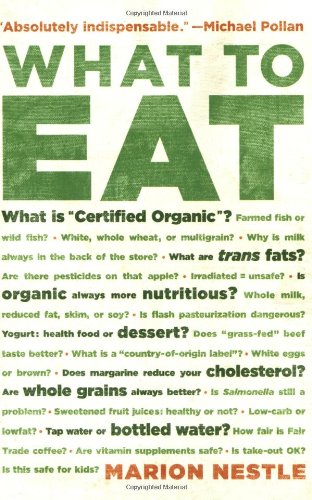Overwhelmed by bread options at the grocery store? How about lettuce? You’re bound to find 10 different options just for romaine lettuce, and more for bread, water, cheese, broccoli — everything! Do you simply guess which product to buy?
In an interview on KUOW Radio’s Speaker Forum, Marion Nestle talks about what foods to buy and she lets you in on some supermarket industry secrets. Namely: the more you see, the more you’re likely to buy.
Listen to the conversation here:
 What To Eat, Marion Nestle (North Point Press, 2007)
What To Eat, Marion Nestle (North Point Press, 2007)
Nestle helps you break down the colossal American supermarket in her book on nutrition and the food industry, “What To Eat.” The Amazon.com review:
How do we choose what to eat? Buffeted by health claims–should we, for example, restrict our intake of carbs or fats or both? Is organic food better for us?–we become confused and tune out. In supermarkets we buy semi-consciously, unaware that our choices are carefully orchestrated by sophisticated marketing strategies concerned only with the bottom line. That we should confront such persuasion is the major point made by nutritionist-consumer advocate Marion Nestle in her extraordinary What to Eat, an aisle-by-aisle guide to supermarket buying and thus an anatomy of American food business. “The way food is situated in today’s society discourages healthful food choices,” Nestle tells us, a fact that finds literal representation in our supermarkets, where food placement–dependant on “slotting fees,” guaranteed advertising and other incentives–determines every purchase we make.
Nestle walks readers through every supermarket section–produce, meat, fish, dairy, packaged foods, bottled waters, and more–decoding labels and clarifying nutritional and other claims (in supermarket-speak, for example, “fresh” means most likely to spoil first, not recently picked or prepared), and in so doing explores issues like the effects of food production on our environment, the way pricing works, and additives and their effect on nutrition.
What Nestle reveals is both discouraging and empowering. Through ubiquitous advertising, almost universal food availability, the growth of portion size, and unchecked marketing to kids, we’re encouraged to eat more than we need, with consequent negative impact on our health. Knowledge is indeed power, and Nestle’s lively, witty, and thoroughly enlightening book–the work, readers quickly see, of a food lover intent on increasing sensual satisfaction at table as well as promoting health–will help its readers become completely cognizant about food shopping. It’s a must for anyone who eats and buys food and wants to do both better. –Arthur Boehm –This text refers to an out of print or unavailable edition of this title.
Click on the cover to buy a copy of this book.

